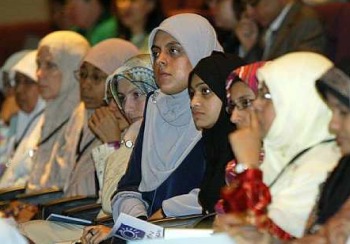Making waves
Stories by SHAHANAAZ HABIB
A convert speaks about the unreasonable pressures on new Muslims.
AUSTRALIAN Susan Carland’s mother was very blunt about what she thought about Islam.
“I don’t care if you marry a drug dealer, but don’t marry a Muslim!” she had told her 17-year-old daughter. Understandably then, when Carland converted to Islam two years after that – and she did not do it for a man! – she didn’t have the guts to tell mum.

“I was really frightened. I didn’t relish the reaction of my mother and friends. It was agonising at that time and I was caught in a lonely place … I felt like a hypocrite,” said Carland, one of the key speakers at a conference on “Muslim Women in the Midst of Change”, held in Kuala Lumpur early this month.
It didn’t take too long for fate to intervene. She came home one day to find her mother happily cooking pork chops for the family. As nervous as she was, Carland was forced to come clean about being a Muslim.
“My mum cried when I told her and things became very tense at home,” she said. She moved out shortly after that.
It has been eight years since and the rift between mother and daughter has healed. “Now, my mum even buys me head scarves and sends presents to my children for Eid.”
But others have not been so accepting. At times when the head-scarved Carland was out shopping back home in Australia with her children, she had people hurl abuses and tell her “to go back from where you came from”.
But she takes such things in her stride – because she has bigger concerns on her plate. Some of her ideas are daunting, such as urging a re-look at mosques, while others are downright pragmatic, like telling those born Muslims to give new converts a break.
Speaking at a dinner talk during the conference, organised by the Muslim Professionals Forum and the Women, Family and Community Development Ministry, Carland, who was named Australian Muslim of the Year in 2004, was brutally honest about the treatment of converts at the hands of “born” Muslims.
“Lifting the Veil” (as her talk was aptly titled), what she had to say certainly made many cringe.
Barely have the last words of the shahada (proclamation of faith) left the lips of new converts, she said, they find themselves bombarded with rules to adhere to.
“Never mind that the sister doesn’t know how to pray. She is told she must get rid of all her old clothing, because it is too Western and thus unIslamic and put on the hijab (head scarf) immediately.
“Don’t worry that our new brother has only been a Muslim for three minutes. He’s already been told that he has to throw out all his music and get rid of his dog or he’d be committing a big sin.”
The list of unreasonable pressures on converts includes telling converts to leave their so-called haram jobs immediately, even if the person had no other source of income.
The newbies are asked to give up hobbies like painting, photography, dancing or playing instruments. They’re advised to move out and sever ties with their kafir (infidel) family and non-Muslim friends, while female converts are urged to get married as soon as possible.
They are often expected to give up their own cultures and take on Arab, sub-continental, Malay or other cultures because these are deemed to be more “Islamic”.
Carland, a lecturer at Monash University in Melbourne, described these demands as not only unreasonable but also “very dangerous” as they made things unnecessarily hard for the convert.
“We often expect brand new converts to start behaving in ways that we may have taken years to do so. By expecting too much of them, too soon, the beauty of the religion that attracted them can quickly become a terrible burden that is simply too much to endure.
“The complete message of Islam was revealed over 23 years. And the Prophet taught almost nothing but tawhid (oneness of God) for the first 13. Alcohol, too, was not banned all at once, but over three stages and several years.So why do we expect new converts to be fully practising Muslims as soon as they convert?”
Carland also takes the Muslim community to task for having an almost schizophrenic attitude towards converts.
On one hand, she pointed out, Muslims liked converts because they made them (the Muslims) feel good about themselves and their faith. But on the flip side, converts were often made to feel inferior by those born Muslims
A practising Muslim herself for years, she finds it maddening whenever “born” Muslims ask her to recite verses from the Quran to prove that she is really one, and knows enough to pray.
“Such encounters are degrading and condescending. How would anyone here feel if I were to ask her to recite some Quranic verses for me to prove her Muslim-ness? Obviously it would be quite insulting. As one convert asked me, ‘When do I stop being seen as the convert and start being seen as a Muslim?’”
As for converts who feel bitter and want to leave Islam, Carland urged Muslims to be gentle and give the person the space to work things through.
“Sometimes all he or she needs is a sounding board, instead of pressure and ridicule. If you have a convert come to you in a state of spiritual angst, he or she may say things that are challenging, perhaps even blasphemous, But we owe it to them to listen and just let them talk it through.”
Converts often have a challenging mind, which is one of the factors that made them Muslims in the first place. Sometimes, having someone listen could be the last thing that helps these people hold on, she said.
“Sometimes just being able to say some things and getting them out is enough. Hopefully they will come out the other side with their faith stronger than ever.
“If not, you can stand in front of Allah on the Day of Judgment and say, ‘I tried. I did my best for this person.’ After all, it is not up to us to change their hearts. You can only do what you can.”
On mosques, Carland said these institutions were just not supportive enough of new converts.
“Female converts report being shouted out, criticised and, worse, simply ignored by both other women and men, the first time they nervously enter a mosque. Often they report leaving in tears,” she disclosed.
In countries like Australia, where Muslims are a minority, the mosque is the one place where new female converts can feel a sense of community, belonging and support. To deny them this haven is simply “injustice and short-sightedness in the extreme”.

She cited an incident in which the father of her close Chinese friend in Malaysia had gone to a mosque here to convert, but was told to leave instead.
She also questioned why mosques seem to have become quiet, silent places of worship, where people go to pray and then leave.
“That’s not our tradition. That’s not how the Prophet saw the mosque and not how His wives or companions saw it. It is supposed to be a social place and a community centre.
“Why can’t we put up a basketball court in the mosque yard and try to get the young to see it as their place? Why can’t we teach Muslim kids hip hop on mosque grounds?
“Right now the young feel isolated from the mosque. It is seen as a place for middle-aged men. If we keep going on this way, we will not have second- or third-generation Muslims. We need to re-think and reinvigorate the mosque.”
Carland’s unconventional ways may ruffle some feathers, but they have won her fans among young Muslims in Australia.
“Often the only interaction young people seem to have with the religion is being told what they cannot do. Don’t listen to music – it’s haram. Don’t have a boyfriend – it’s haram. Stop showing your hair – haram, haram, haram.
“It doesn’t sound like a whole lot of fun when you are young and there’s a whole lot of peer pressure. You’ve got to show the young people that Islam is something they can be proud of. And that fun can be halal.”
Once, after asking young Muslims what they would like, she followed through by getting male and female dance teachers and organising separate classes for boys and girls. She even got a bunch of Arab comedians to show up and tell a whole lot of halal (clean) jokes This proved to be a hit with the young Muslims.
“You don’t have to just sit in your room and recite the Quran and that is the sole existence of your life. You can still come out and have a good time, within a certain framework.”
There are certainly some among the Muslim community who do not approve of what she does. But for Carland, it is worth it to reach “a bit further” and engage disenfranchised Muslims, some of whom have never set foot in the mosque.
As for the lot of women, she told how gossip was often used, successfully, to control them.
She noted how Muslims (men included) tended to talk of great Muslim women like Khadijah and Aishah, the wives of the Prophet, and yet “not allow the women of today to walk the talk”.
“Women should get out there. Use the wives and female companions of the Prophet as evidence that we can do these things. Sometimes you’ve just got to make waves. Someone has to go out on a limb, and that’s when things change.
“Women have an amazing capacity to change society – much more than men. So just do it,” she said.
Carland has undoubtedly gone out on a limb to make change. Even if she has not made waves, she has certainly made ripples.